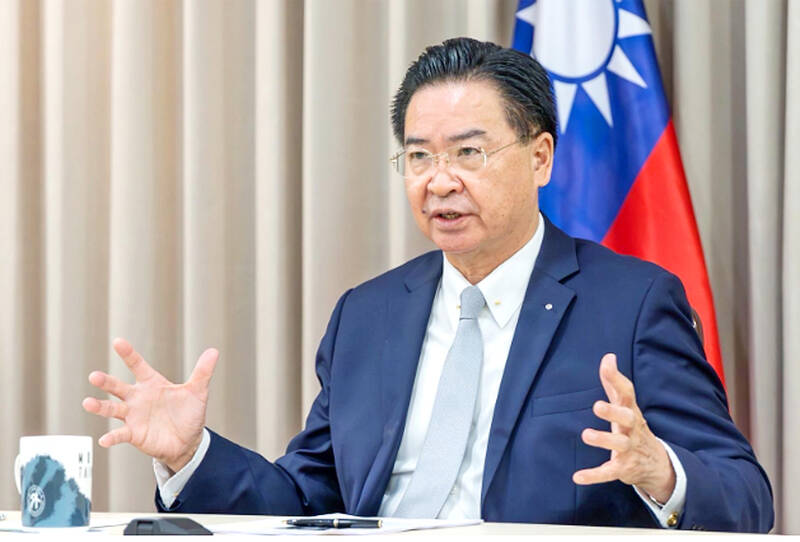Minister of Foreign Affairs Joseph Wu (吳釗燮) blasted Beijing for deliberately upsetting the “status quo” in the Taiwan Strait by using cognitive warfare that is increasingly difficult to recognize, in an exclusive interview with French newspaper Le Monde.
In the interview with Hong Kong correspondent Florence de Changy published on Tuesday, Wu reiterated Taiwan’s stance of being “moderate and responsible” regarding cross-strait affairs, a standing policy during President Tsai Ing-wen’s (蔡英文) administration.
Wu said Beijing is attempting to influence the presidential and legislative elections next week by trying to convey them as a choice between war and an economic slowdown if the DPP wins, and peace and prosperity if the Chinese Nationalist Party (KMT) wins.

Photo courtesy of the Ministry of Foreign Affairs
Beijing’s methods of influencing Taiwanese are becoming increasingly difficult to perceive, he said.
While China’s military threat toward Taiwan is growing and its attempts to spread disinformation, infiltrate the country and tactics of weaponizing the economy all contribute to a “grim” situation in the Taiwan Strait, analyses from intelligence agencies in Taiwan, the US and other countries show that, “war [with China] is not imminent, but neither is it inevitable,” Wu said.
However, Wu said that the “status quo” is being changed, he said.
“The ‘status quo’ is based on a tacit agreement between Taiwan and China, but China no longer wishes to abide by such agreements — China’s fighter jets are constantly crossing the median line, while its naval ships are inching ever closer to Taiwan in more frequent and larger military exercises ... this is unprecedented,” he said.
Wu also cited Beijings attempts to distort UN Resolution 2758 to convince others that Taiwan is legally a part of China as part of its efforts to change the “status quo.”
UN Resolution 2758 was passed by the UN General Assembly in 1971. It states that the People’s Republic of China is the sole legitimate government of China to the UN. However, it does not touch on the issue of Taiwan’s sovereignty.
Wu also said that Taiwan “welcomed” the French government’s military programming law (LPM) for 2024-2030, which states that France would defend freedom of navigation in the region — including in the South China Sea and the Taiwan Strait — according to the UN Convention on the Law of the Sea.
Speaking about Taiwan-US relations, he said that the “status quo” would not have existed without the US’ strong support over the years.
China is attempting to sow doubt in the minds of the Taiwanese, using the Russia-Ukraine war to insinuate that the US’ reluctance to be directly involved is a reflection of the US’ attitude toward Taiwan, Wu said.
However, it is clear that “China threatens Taiwan, and the US supports Taiwan,” he said.
Wu ended the interview by saying: “It is our responsibility to defend Taiwan. No nation is obligated to help us.”

Taiwanese can file complaints with the Tourism Administration to report travel agencies if their activities caused termination of a person’s citizenship, Mainland Affairs Council Minister Chiu Chui-cheng (邱垂正) said yesterday, after a podcaster highlighted a case in which a person’s citizenship was canceled for receiving a single-use Chinese passport to enter Russia. The council is aware of incidents in which people who signed up through Chinese travel agencies for tours of Russia were told they could obtain Russian visas and fast-track border clearance, Chiu told reporters on the sidelines of an event in Taipei. However, the travel agencies actually applied

New measures aimed at making Taiwan more attractive to foreign professionals came into effect this month, the National Development Council said yesterday. Among the changes, international students at Taiwanese universities would be able to work in Taiwan without a work permit in the two years after they graduate, explainer materials provided by the council said. In addition, foreign nationals who graduated from one of the world’s top 200 universities within the past five years can also apply for a two-year open work permit. Previously, those graduates would have needed to apply for a work permit using point-based criteria or have a Taiwanese company

The Shilin District Prosecutors’ Office yesterday indicted two Taiwanese and issued a wanted notice for Pete Liu (劉作虎), founder of Shenzhen-based smartphone manufacturer OnePlus Technology Co (萬普拉斯科技), for allegedly contravening the Act Governing Relations Between the People of the Taiwan Area and the Mainland Area (臺灣地區與大陸地區人民關係條例) by poaching 70 engineers in Taiwan. Liu allegedly traveled to Taiwan at the end of 2014 and met with a Taiwanese man surnamed Lin (林) to discuss establishing a mobile software research and development (R&D) team in Taiwan, prosecutors said. Without approval from the government, Lin, following Liu’s instructions, recruited more than 70 software

BACK TO WINTER: A strong continental cold air mass would move south on Tuesday next week, bringing colder temperatures to northern and central Taiwan A tropical depression east of the Philippines could soon be upgraded to be the first tropical storm of this year, the Central Weather Administration (CWA) said yesterday, adding that the next cold air mass is forecast to arrive on Monday next week. CWA forecaster Cheng Jie-ren (鄭傑仁) said the first tropical depression of this year is over waters east of the Philippines, about 1,867km southeast of Oluanpi (鵝鑾鼻), and could strengthen into Tropical Storm Nokaen by early today. The system is moving slowly from northwest to north, and is expected to remain east of the Philippines with little chance of affecting Taiwan,